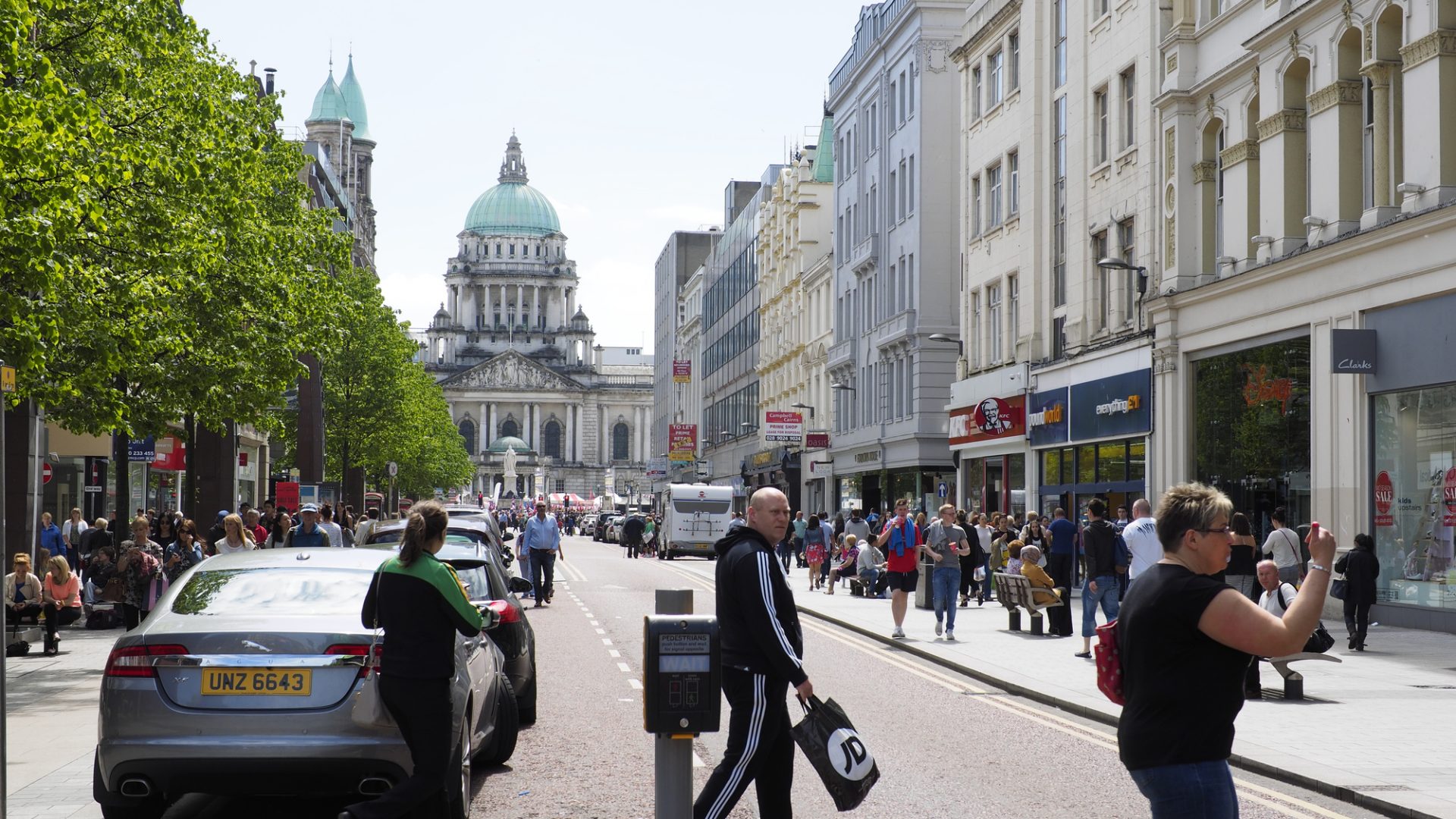

Now in its third year, Life in the UK is beginning to offer a longer-term story of what life is like for people in the UK and in each of its devolved jurisdictions. In Northern Ireland there is a continued picture of stagnation across the four wellbeing domains.
- Democracy
- Economy
- Environment
- Evidence and reports
- Inequality
- Measuring wellbeing
- Society
- Carnegie UK
- 9 November 2025
- ISBN: 978-1-917536-07-3
- 13 minute read
Collective wellbeing in Northern Ireland 2025
The overall score for collective wellbeing in Northern Ireland in 2025 is 62 out of a possible 100. Although the score was 60 in 2024, it is not a statistically significant increase that has been seen between the years. Although some of the scores are different across the years on the individual domains, none of these are statistically significant as either increases or decreases. We are therefore seeing continued stagnation.
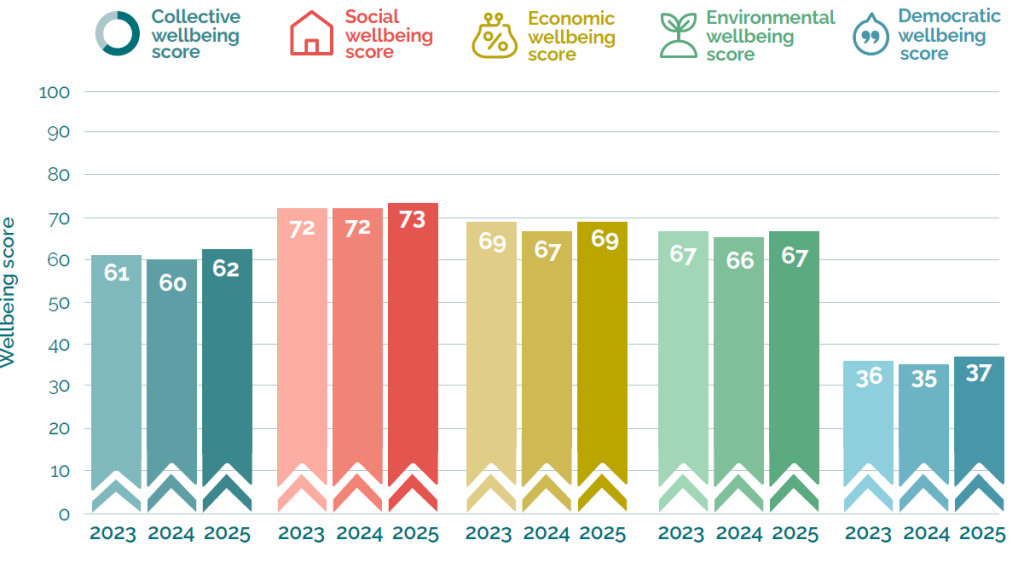
Understanding what influences collective wellbeing
Across the three years of Life in the UK, scores for Northern Ireland have remained unchanged. People in Northern Ireland still have lower economic and, particularly, democratic wellbeing scores than the UK as a whole, although environmental wellbeing remains higher than for the UK overall. There have been promising improvements in some elements that contribute to democratic wellbeing, but these do not yet amount to a higher overall democratic wellbeing score in Northern Ireland.
It is also still the case that people within Northern Ireland have distinctly different levels of wellbeing based on their circumstances. The factors that are associated with especially wide gaps in collective wellbeing reflect those found in previous years.
In 2025, the following factors stand out as particularly important in predicting a lower or higher collective wellbeing score:
- The higher the household income, the higher the collective wellbeing score: People with a household income of over £100,000 a year have a collective wellbeing score of 73. This is 21 points higher than for those whose household income is below £26,000 a year. Those with a household income between £26,000 and £51,999 have a collective wellbeing score of 63, and those with a household income of over £52,000 and below £100,000 have a collective wellbeing score of 66.
- Being disabled is strongly associated with lower collective wellbeing: Disabled people have a collective wellbeing score of 53. This is 12 points lower than for those without a disability.
The following are also notable influences on a person’s collective wellbeing:
- Living in social or privately rented housing: People who rent their home from a council or housing association have a collective wellbeing score of 46. This is 18 points lower than for those who are homeowners. People who are private tenants have a collective wellbeing score of 55, also lower than for homeowners.
- Age: People aged 16 to 34 have a collective wellbeing score of 59. This is seven points lower than for those aged 55 or over.
- Community background: People from a Catholic community background have a collective wellbeing score of 59. This is six points lower than for those from a Protestant community background.
Collective wellbeing map
Social wellbeing is about everyone being able to achieve their potential and contribute to society because they have their basic needs met. Our basic needs include having access to health and social care, education, housing, transport, digital resources and childcare.
To determine trends in social wellbeing across Northern Ireland, we asked questions about access to public services,
community relationships, safety and community cohesion, and self-reported health and mental health.
The people most likely to experience high levels of social wellbeing in Northern Ireland in 2025 are:
- People with an annual household income of above £100,000, who have a social wellbeing score of 83. This is 19 points higher than for those with an annual household income of below £26,000. Those whose annual household income is between £26,000 and £51,999 have a social wellbeing score of 74, and those whose household income is between £52,000 and £99,999 have a social wellbeing score of 78.
In contrast, the people who are likely to experience low levels of social wellbeing in Northern Ireland in 2025 are:
- People who rent from a council or housing association, who have a social wellbeing score of 56. This is 20 points lower than for homeowners.
- Disabled people, who have a social wellbeing score of 60. This is 18 points lower than for those without a disability.
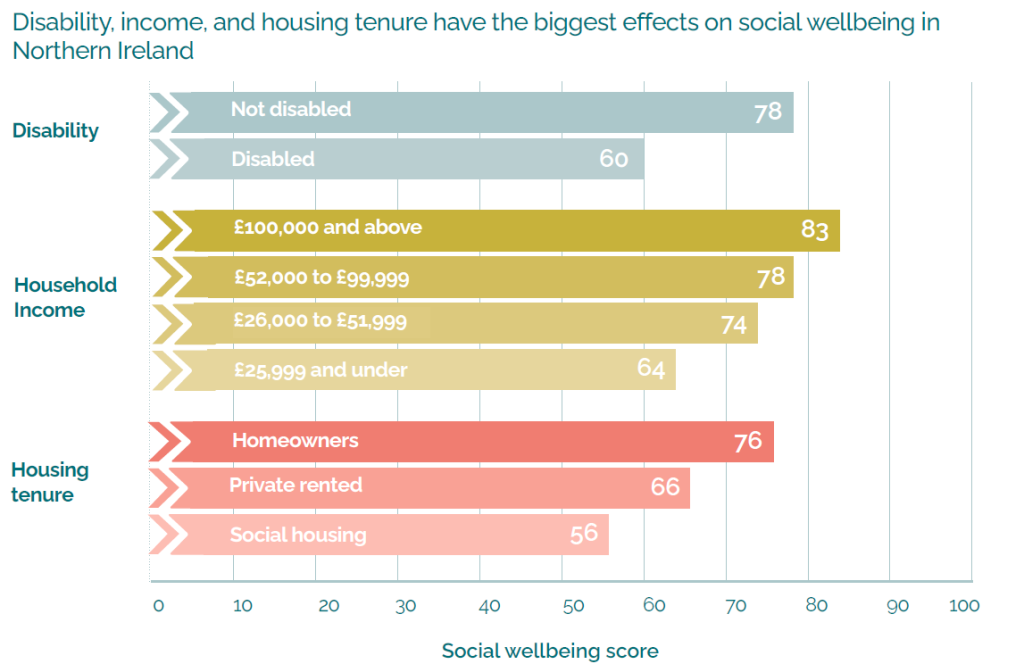
Social wellbeing – standout statistics
While in some social indicators Northern Ireland does better than the UK as a whole, these are balanced by other indicators where things are worse.
- 72% feel that they could rely on someone in their neighbourhood to help them if they were alone and needed help, six percentage points higher than the UK average.
- 64% say that it is difficult to get a GP appointment when they need one, 16 percentage points higher than the UK average.
- 30% find it difficult to access public transport that can get them where they need to go, 11 percentage points higher than the UK average.
- 27% do not feel safe walking alone in their local neighbourhood after dark, six percentage points higher than in 2024.
- 10% say that they are in bad general health, four percentage points higher than the UK average, while 11% say they are in bad mental health, two percentage points higher than the UK average.
Social wellbeing summary
The social wellbeing of people in Northern Ireland is now 73 out of 100. This score has not changed in a statistically significant way since Life in the UK first reported in 2023, but it remains higher than the UK as a whole.
However, there remain disparities amongst demographic groups related to clear inequalities in society. Disability status and housing tenure play key roles in a low social wellbeing score while high social wellbeing correlates to higher levels of income.
There have been few changes in social wellbeing compared to last year, however there are some differences compared to the UK overall. People in Northern Ireland feel that they could rely on someone in their neighbourhood to help them if they were alone and needed help, this is higher than the UK overall. People in Northern Ireland are also less likely than the UK overall to be able to access public transport that can get them where they want to go. One notable change between 2o24 and 2025 is that people in Northern Ireland were more likely to feel unsafe walking alone in their local neighbourhood after dark.
On health-related measures, people in Northern Ireland remain less likely than the UK as a whole to be able to get a GP appointment at the time they need one. They are also more likely to be in poor general and mental health than the UK overall.
Social wellbeing requires everyone within a society to feel that they are a valued part of their community, and improving people’s social wellbeing brings many benefits, both to individuals and society as a whole.
Economic wellbeing in Northern Ireland 2025
Northern Ireland scores 69 out of a possible 100 for economic wellbeing.
Economic wellbeing means that everyone has a decent minimum living standard and can absorb financial shocks. This includes access to a decent income, affordability, financial resilience, job opportunities and skills.
To determine trends in economic wellbeing across Northern Ireland, we asked questions about skills and job availability, and the affordability of essential items like food and fuel.
The people most likely to experience high economic wellbeing in Northern Ireland in 2025 are:
- People with a household income of over £100,000 a year, who have an economic wellbeing score of 86. This is 33 points higher than for those whose annual household income is below £26,000 a year. Those with an annual household income of £26,000 to £51,999 have an economic wellbeing score of 70, and those whose annual household income is between £52,000 and £99,999 have an economic wellbeing score of 79.
In contrast, the people who are likely to experience low economic wellbeing in Northern Ireland in 2025 are:
- People living in social housing, who have an economic wellbeing score of 42. This is 32 points lower than for homeowners.
- Disabled people, whose economic wellbeing score is 58. This is 16 points lower than for those without a disability.
- People from a Catholic community background, who have an economic wellbeing score of 66. This is seven points lower than for those from a Protestant community background.
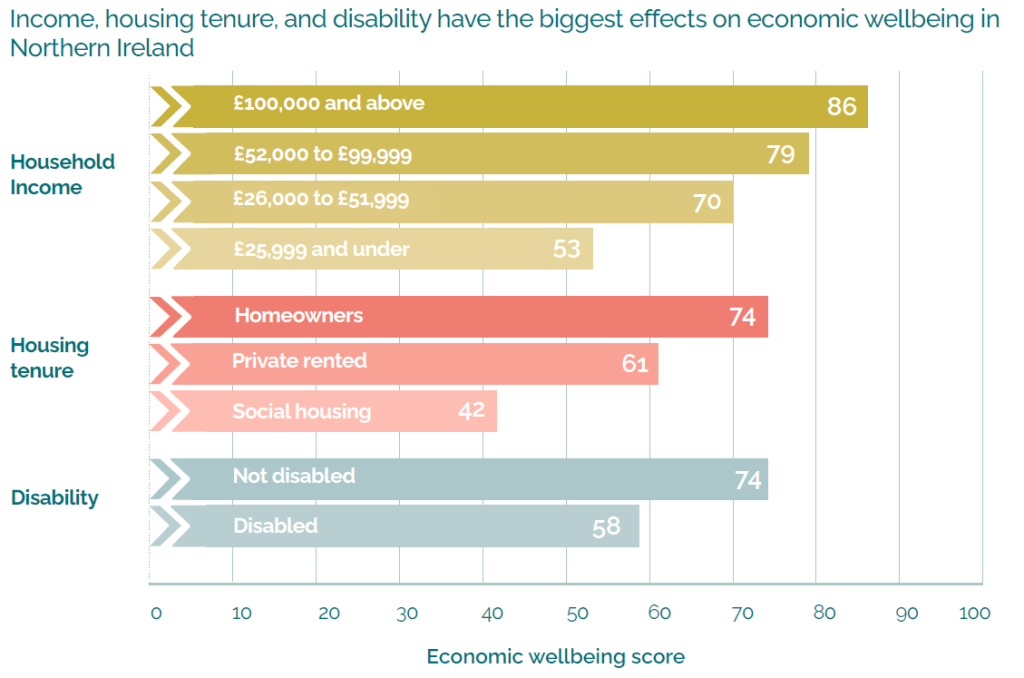
Economic wellbeing – standout statistics
There is still a mixed picture for economic wellbeing in Northern Ireland.
- 81% of people can afford to keep their home heated adequately. This has improved from 73% in 2024.
- 34% of people are satisfied with the availability of job opportunities in their local area. This is higher than the UK overall result of 26%.
- 33% of people report their household could not afford an unexpected but necessary expense of £850, higher than the UK overall result of 28%.
Economic wellbeing summary
The economic wellbeing of people in Northern Ireland has remained stagnant since 2023, at 69, and remains lower than across the UK as a whole.
Although some indicators have improved, people in Northern Ireland remain less likely than people in the UK overall to be able to afford things like unexpected expenses, socialising outside of their home once a month, and a week’s annual holiday away from home.
There have, however, been some improvements this year. People are more likely to be able to afford to keep their homes adequately warm, including in the winter. Some factors, including age and area deprivation, are less likely this year than in previous years to have an effect on people’s economic wellbeing.
Unlike in the UK overall, dissatisfaction with job opportunities in the local area has not increased in Northern Ireland since 2024. Satisfaction with local job opportunities in Northern Ireland is also higher than it is across the UK as a whole.
However, as with the other domains we still see inequalities between those who have higher and lower levels of economic wellbeing. Unsurprisingly, higher economic wellbeing correlates with higher income, but other factors also have a notable effect, with disabled people, those in social housing and those from a Catholic community having lower levels of economic wellbeing.
Environmental wellbeing in Northern Ireland 2025
Northern Ireland scores 67 out of a possible 100 for environmental wellbeing.
Environmental wellbeing means that everyone has access to green and blue spaces and collectively we live within the planet’s natural resources, protecting the environment for future generations.
To determine trends in environmental wellbeing across Northern Ireland, we asked questions about access to and the quality of local parks, rivers and other green and blue spaces, and about noise pollution, air pollution, and litter in local areas. We also asked about levels of satisfaction with efforts to preserve the environment.
The people most likely to experience high environmental wellbeing in Northern Ireland in 2025 are:
- People over the age of 55, who have an environmental wellbeing score of 71. This is nine points higher than for those aged 16 to 34.
- People with a household income of £100,000 and above a year, who have an environmental wellbeing score of 75. This is 13 points higher than for those with a household income of below £26,000.
In contrast, the people who are likely to experience low environmental wellbeing in Northern Ireland in 2025 are:
- Disabled people, who have an environmental wellbeing score of 63. This is six points lower than for those without a disability.
- People from a Catholic community background, who have an environmental wellbeing score of 64. This is seven points lower than for those from a Protestant community background.
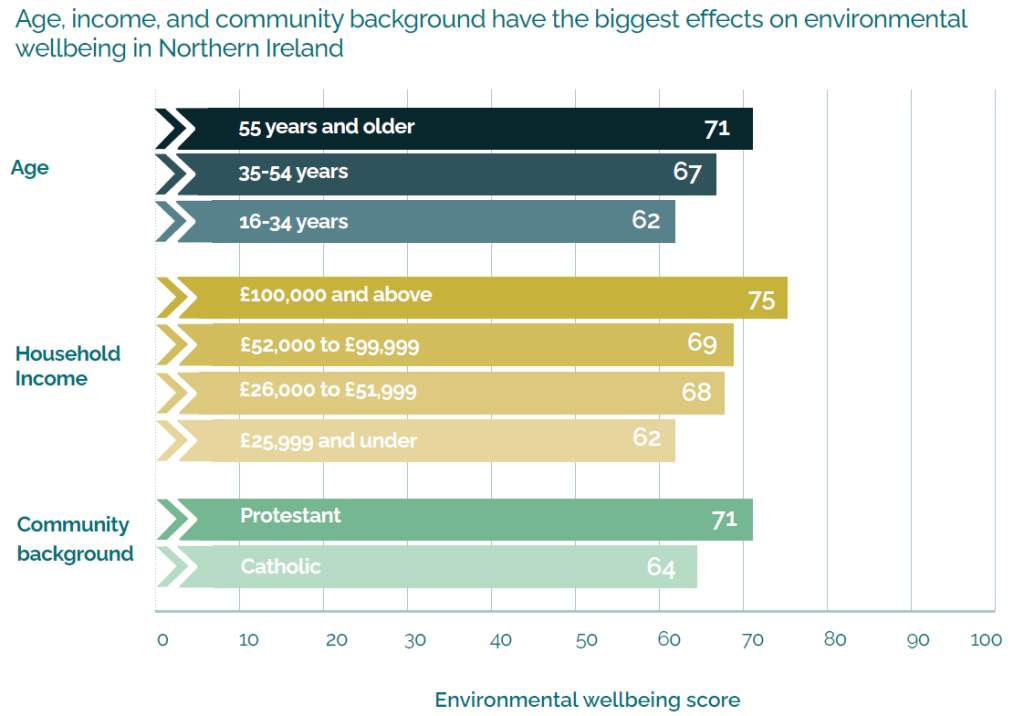
Environmental wellbeing –
standout statistics
Few changes have been seen in environmental indicators, but Northern Ireland continues to have higher environmental wellbeing than the UK as a whole.
- 69% of people are satisfied with the quality of their local open, public, or green space.
- 53% report problems with noise pollution in their local neighbourhood. However, this is lower than the UK overall result of 64%.
- 24% of people are satisfied with efforts to preserve the environment in the UK, similar to previous years.
Environmental wellbeing summary
The environmental wellbeing of people in Northern Ireland has remained stable since Life in the UK commenced, with a score of 67 this year. People in Northern Ireland remain likely to have higher environmental wellbeing than the UK as a whole. People in Northern Ireland were also less likely to experience problems with litter, air quality, and noise pollution than the UK as a whole.
Age and income continue to be indicators of high environmental wellbeing, indicators that also appear in higher wellbeing in other domains. Being disabled remains a factor for lower environmental wellbeing, alongside being from the Catholic community.
Only 24% of people in Northern Ireland say that they are satisfied with efforts to preserve the environment in the UK.
Democratic wellbeing in Northern Ireland 2025
Northern Ireland scores 37 out of a possible 100 for democratic wellbeing.
Democratic wellbeing is about everyone having a voice in decisions made that affect them. This means having local and
national leaders who support participation, foster trust, and encourage diversity.
To understand democratic wellbeing in Northern Ireland in 2025, we asked questions about levels of trust in local, regional and national government(s), perceptions of personal ability to influence decisions.
Democratic wellbeing in Northern Ireland is chronically low for all groups, but the people who are likely to have the lowest democratic wellbeing scores are:
- People with an annual household income of below £26,000, who have a democratic wellbeing score of 30. This is nine points lower than for those whose annual household income is between £26,000 and £99,999, and 17 points lower than for those whose annual household income is £100,000 or more.
- Disabled people, who have a democratic wellbeing score of 32. This is eight points lower than for those without a disability.
- People from a Catholic community background, who have a democratic wellbeing score of 33. This is eight points lower than for those from a Protestant community background.
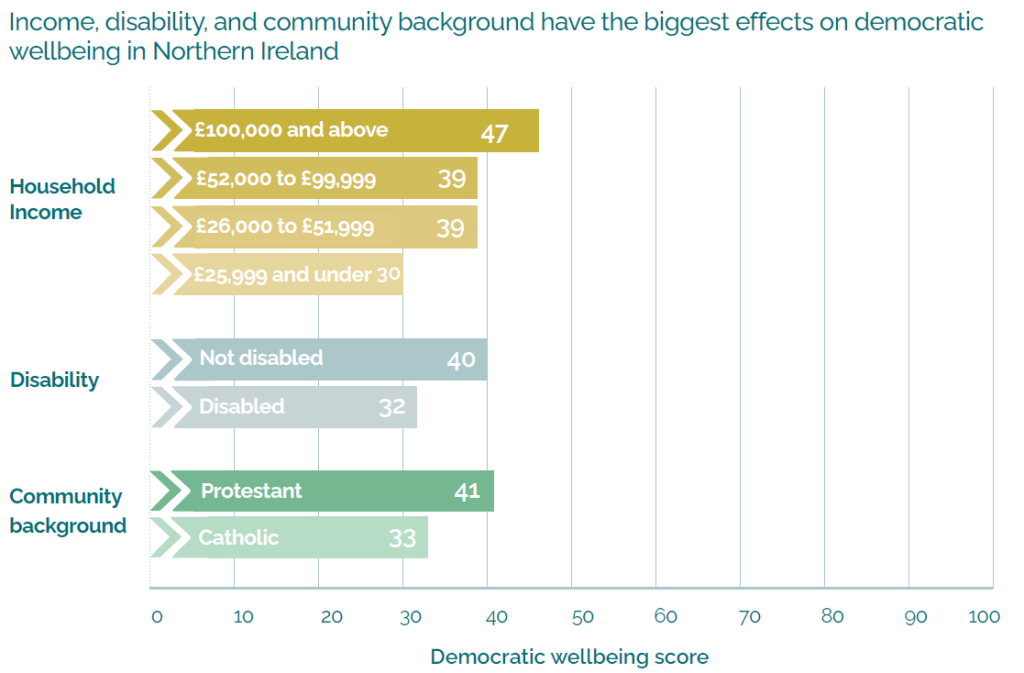
Democratic wellbeing – standout statistics
Trust in the UK Government has improved, as has trust in the devolved government and other institutions.
- 55% of people in Northern Ireland have low trust in the UK Government, nine percentage points lower than in 2024. This is still higher than the results for the UK as whole at 45%.
- 46% of people in Northern Ireland have low trust in the Northern Ireland Executive, eight percentage points lower than in 2024 and 20 percentage points lower than in 2023.
Democratic wellbeing summary
As in previous years, the democratic wellbeing of people in Northern Ireland is the lowest of all the domains, at 37 this year, and Northern Ireland has the lowest democratic wellbeing of any of the UK jurisdictions.
There have, however, been some improvements. Fewer people have low levels of trust in the UK Government compared to 2024, and fewer people have low levels of trust in MPs. Low trust in the Executive has improved from 66% in 2023 to 46% in 2025, with similar changes recorded for trust in Assembly members. These findings point to a continued improvement in trust in the devolved government and parliamentarians. This may reflect the ongoing positive effects of the restoration of the Executive in February 2024.
Like in other domains, change has not been felt evenly. Income, disability, and community background all have an impact on democratic wellbeing.
Get in touch
Want to chat about Life in the UK 2025 Northern Ireland? Get in touch with Susan.
Help us make the case for wellbeing policy
Keep in touch with Carnegie UK’s research and activities. Learn more about ways to get involved with our work.
"*" indicates required fields

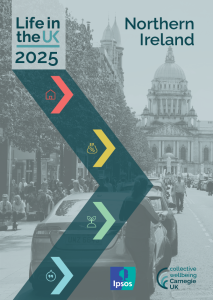
Social wellbeing in Northern Ireland 2025
Northern Ireland scores 73 out of a possible 100 for social wellbeing.